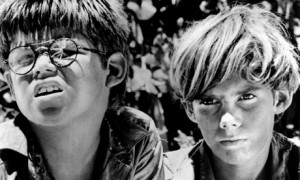Since you asked, these are my top 10 books. I was going to post them all at once but it turns out it takes me ages to write each one, because my mental filing system is in such unholy disarray. They’re in no particular order. I may well have forgotten something hugely important and will chastise myself later, and, yes, my choices don’t exactly span the ages, but at least I’m not picking titles that I think make me look smart.
1. Lord Of The Flies by William Golding
A lot of novels suffer for being put on the GCSE syllabus. It’s kind of like, well yeah, of course you’ve read that, we all have, when we were fifteen. Aren’t you over it by now? Or maybe this is the wages of a university education – the constant handwringing over whether your reading matter is worthy enough.
So Lord of the Flies is a story about a planeload of schoolboys who crashland on a remote island and, left unsupervised, slowly descend into superstitious, bloodythirsty savages. The protagonist is Ralph, who is just about morally crap enough to be likeable – he knows the difference between right and wrong, but he’s not always brave enough to stick up for it. His nemesis is the charismatic Jack, who ends up styling himself as a sort of terrifying shaman-chief. Then there’s Piggy, who’s basically Roland out of Grange Hill, a wheezing, shrill bully magnet who is of course the most sympathetic character in the story and therefore Must Suffer.
Perhaps LotF‘s most powerful message for the modern reader is the reminder of just how shit Lost was. I’m not sure I really get behind the whole ‘original sin’ business, and this idea that humanity is intrinsically, horrifyingly corrupt, deep down. That’s a little too Catholic for me, and the sort of pessismistic viewpoint that ends up being appropriated to justify all sorts of curtailing of liberties. It’s one of the assumptions behind Chinese Legalism, which is brutal and totalitarian. But certainly, this idea that fear can make people do nasty things, I can buy that. I guess my takeaway from that – and a perfectly legit way of reading the book – is that this should be a source of sympathy and a reason to feel a common bond with one’s fellow humans, rather than an excuse to shake one’s head and take bugger all personal responsibility for making the world a better place.
The main thing that makes LotF great is that it’s a well-written, readable book with plausible, engaging characters. Golding is a great crafter of prose, with a knack for capturing the visual. He also knows when to keep his writing simple. As a result, things move at a fantastic clip, and you feel as if you’re there. Even when he’s describing ostensibly mundane things, like the weather, the writing is great:
Over the island the build-up of clouds continued. A steady current of heated air rose all day from the mountain and was thrust to ten thousand feet; revolving masses of gas piled up the static until the air was ready to explode. By early evening the sun had gone and a brassy glare had taken the place of clear daylight. Even the air that pushed in from the sea was hot and held no refreshment. Colours drained from water and trees and pink surfaces of rock, and the white and brown clouds brooded. Nothing prospered but the flies who blackened their lord and made the spilt guts look like a heap of glistening coal.
Yes, the prose gets a little heavy-handed and portentous in places, but I can forgive Golding his editorialising for the taut, vivid writing that predominates. His novel The Inheritors suffers from the same tick – that urge to break up the beautiful, spare, third-person limited voice with a sudden switch to a rather pompous detached narrator who explains what it all means, like a smug 19th century anthropologist opining on some remote tribe. I have an uneasy feeling that Golding’s acceptance into the literary establishment rests, in part, on these moments where he states, baldly, that this is not just a story, but a worthy philosophical parable, but the bottom line is, he wrote some cracking stories that keep you turning the page.
Reading LotF was a huge turning point for me. It was the first time I ever really understood that a story could be about something – that, beyond exciting, clever scenarios or witty dialogue, a story could have something to say. Obviously, from a very young age we’re presented with stories that are cautionary tales, that are supposed to have a message beyond the events they portray, but I’d never really internalised that as a possibility for adult fiction – you know, this idea that the various characters might represent different attitudes, different factions, that underpinning any story was an ideology.
It really changed my life. I’d always wanted to be a writer, but from that moment, my conception of what a writer could be, of what a novel could be, totally transformed. I suppose it took me a little longer to balance things out, and remember the simple (and distressingly rare) pleasure of the good story, well told, but I think that LotF was the first time in my life that I formed a rough conception of – for want of a better word – literariness.
What do you think? Did you love it? Did you hate it? Be really interested to hear other people’s take on it.

